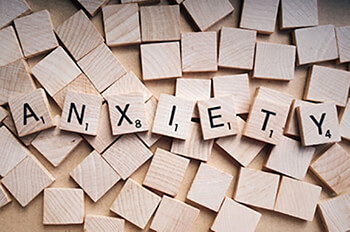 As a counselor, I would like to say that I have mastered every mental health challenge that has come my way. However, that would be dishonest. Every week, I converse with a number of hard working people who struggle with the same thing that I intermittently struggle with and that is anxiety. I have experienced anxiety symptoms so strongly that I felt as if I just ran a 5k with no training. Despite the heart palpitations, heaviness in my chest, and the subsequent shortness of breath, my mindset was, “I have to get x, y, and z done.” I used to ignore my anxiety symptoms just like the clients I work with.
As a counselor, I would like to say that I have mastered every mental health challenge that has come my way. However, that would be dishonest. Every week, I converse with a number of hard working people who struggle with the same thing that I intermittently struggle with and that is anxiety. I have experienced anxiety symptoms so strongly that I felt as if I just ran a 5k with no training. Despite the heart palpitations, heaviness in my chest, and the subsequent shortness of breath, my mindset was, “I have to get x, y, and z done.” I used to ignore my anxiety symptoms just like the clients I work with.
Anxiety symptoms are sometimes ignored or excused as someone who is just feeling stressed or nervous. Symptoms can be so extreme that it may be difficult for someone to perform daily tasks. It is very unlikely that when these symptoms arise, one can call into work and say, “Hey, Boss. I’m feeling a little anxious today so I’m taking the day off.” A mental health day is necessary sometimes, however, what is also essential is recognizing anxiety and knowing ways to manage it effectively.
In my profession, I encounter many people struggling to manage their anxiety symptoms. Some people have trembling voices and avoid eye contact. Others are the polar opposite, they are bubbly, positive but feel panic underneath it all. Whether a person’s anxiety symptoms are noticeable or not, it is important to know anxiety can affect an individual physically, emotionally and behaviorally.
- Physical Symptoms
- Heart palpitations
- Nausea
- Shortness of breath
- Numbness/tingling of finger/toes
- Behavioral Symptoms
- Avoidance
- Irritable
- Isolating
- Self- medicating (through drugs/alcohol)
- Psychological Symptoms
- Racing thoughts
- Mind going blank
- Worrying
- Thoughts of doom
In early 2018, I attended a seminar that focused on self-care as a way to manage anxiety. One of the questions the trainer emphasized was, “Are you eating? Sleeping? Breathing?” Anxiety symptoms can be magnified or minimized based on the food we eat, our sleep hygiene and how we breath. For example, drinking coffee or soda can increase anxiety symptoms due to the caffeine and its stimulating effects on the body. Positive self-care choices such as reducing or eliminating caffeine, alcohol, nicotine, and processed sugar can aid in managing anxiety.
Sleeping well can be difficult for a person struggling with anxiety. Oftentimes, an anxious individual may stay in bed developing a to-do list in their head, worrying, and/or reading social media posts. Appropriate sleep hygiene such as avoiding stimulants several hours before bedtime, limiting alcohol use, turning off devices (such as tvs, computers, and phones), and establishing a sleep schedule will aid in getting better rest.
The whole body is affected based on how a person breaths. Shallow breathing can increase the heart rate, cause perspiration, and magnify anxiety symptoms. Deep breathing lowers the heart rate, lowers blood pressure, and creates a calm mind. Instead of short quick breaths, it is more effective to take a deep breath in until you feel your belly slightly rise and then exhale slowly. Deep breathing helps with mental clarity and it is recommended to practice deep breathing exercises daily.
If you are struggling to manage anxiety or you would like to process life stressors, Methodist Healthcare EAP is here to assist. Methodist Healthcare EAP offers free and confidential counseling to you and members of your household. Please call us today at (901) 683-5658 or toll free 1-800-880-5658 to schedule an appointment.

Kima Richard is a Licensed Professional Counselor with a designation of Mental Health Services Provider. She is a graduate of Our Lady of Holy Cross College, where she earned a Master of Arts in Counseling. She has experience working with individuals and groups to address issues such as stress, anxiety, grief and loss, substance abuse, and depression. In her spare time, she enjoys reading, writing, and spending time with family.
